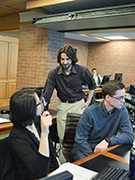
Upcoming Courses
Still looking for classes to take this fall? Check out a few exciting DH-related courses below!
If you are teaching a course connected to DH and would like it included, please email the DHLab.
The American Counterculture, ENGL 195 Mondays, Wednesdays 1:30-2:20pm R. John Williams
This lecture offers an introduction to the notion of the "counterculture" as both a historical and literary phenomenon. We will not only introduce basic definitions of the concept (as understood by participants in the 1960s and 1970s), but also complicate those same definitions, offering more nuanced explorations of what it meant to cultivate an experience that ran "counter" to the dominant practices of American bourgeois society. DH Fellow Kimberly Quiogue Andrews will assist with this course.
Avant-Gardes and Émigrés, RUS 384/690 Tuesdays, Thursdays 11:35am-12:50pm Marijeta Bozovic
The Avant-Gardes and Émigrés Lab, a highly collaborative experimental seminar open to graduate students and advanced undergraduates, has two primary objectives: to familiarize students with the work of some of the most influential Russian artists, writers, and thinkers of the twentieth century; and to introduce students to new ways of conducting and presenting research, using digital tools. DH Fellow Carlotta Chenoweth will assist with this course.
Computational Tools for Data Science, CPSC 262/STAT 262 Tuesdays, Thursdays 2:30-3:45pm Daniel Spielman
This course provides an introduction to the core ideas and principles that arise in modern data analysis, bridging statistics and computer science and providing students the tools to grow and adapt as methods and techniques change. Topics include principle component analysis, independent component analysis, dictionary learning, neural networks, clustering, streaming algorithms (streaming linear algebra techniques), online learning, large scale optimization, simple database manipulation, and implementations of systems on distributed computing infrastructures. Students require background in linear algebra, multivariable calculus, and programming.
Take after or concurrently with MATH 222, 225, or 231, after or concurrently with MATH 120, 230, or ENAS 151, after or concurrently with CPSC 100, 112, or ENAS 130
Gender & Sexuality in Media and Popular Culture, AMST 402/ANTHRO 302/FILM 324/WGSS 380 Tuesdays 2:30-4:20pm T.L. Cowan, Laura Wexler
As part of the FemTechNet DOCC, this seminar on popular culture in the United States and transnationally will teach digital skills via a significant lab component in which students use media technologies to make and illustrate arguments. In the course, we will discuss gender, race, class, and sexuality in relation to the production, circulation, consumption, and reception of media culture.
Introduction to Latin American History, HIST 325 Mondays, Wednesdays 10:30-11:20am Anne Eller
This lecture class offers an introduction to critical themes and events across a broad swath of Latin America’s history. The course considers major formative epochs and themes of race, class, and gender through the exploration of case studies from across the Central and South America and the Caribbean. In order to engage meaningfully with these themes, the approach of the course is two-fold. First, lectures offer a broad sweep of events, zooming in on moments of particular interest in ample context. The readings, discussion section, and digital humanities elements, meanwhile, focus much more closely on individual countries, events, and groups. DH Fellow Brandi Waters will assist with this course.
Quantitative Linguistics using Corpora, LING 234/634 Wednesdays 4:00-5:50pm Kevin Tang
This course provides an introduction to the basics of corpus linguistics. Students will learn how to compile and process corpora, as well as how to conduct statistical tests in R in order to better understand linguistic patterns. We will both create new corpora (through Webmining using BootCat) and use existing sets (e.g. COCA, British National Corpus) to discuss how extracted norms can be used to predict behavioral data. Digital humanities students from other departments are welcome.